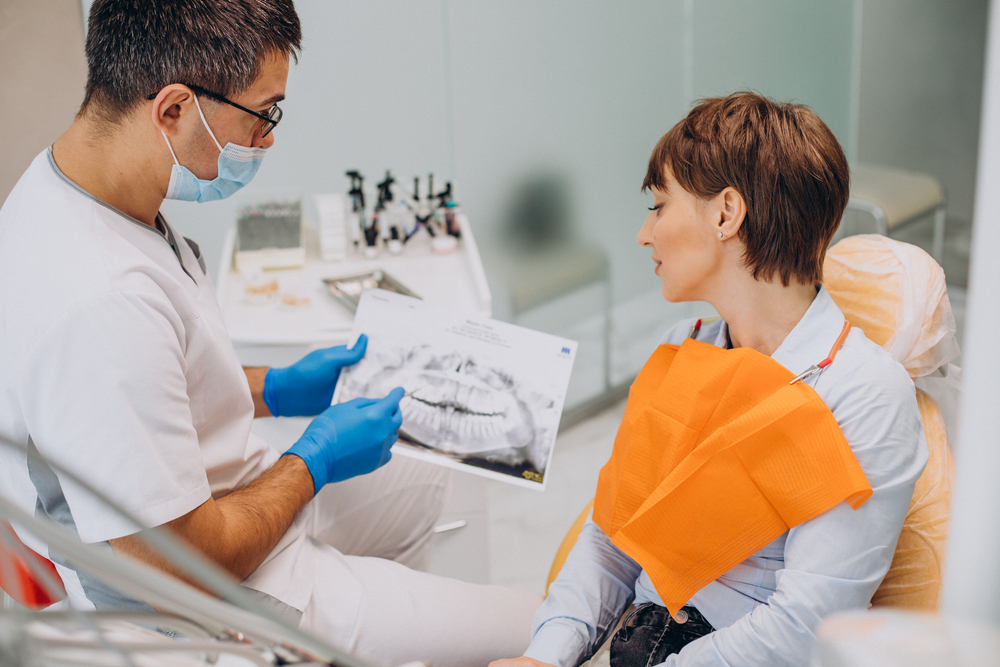
How to Treat and Prevent Swelling Around Dental Implants?
As a leading provider of dental implants in Naperville, IL, we know getting an implant is an investment in your oral health and smile. That’s why it’s alarming if you notice swelling. Is it a normal part of the healing process? Is it one of the signs of dental implant failure?
Our American board-certified prosthodontist, Dr. Anthony LaVacca, has extensive specialty training in placing and maintaining dental implants. We’re tapping into his knowledge to discuss how swelling around dental implants should be treated, as well as how it can be prevented.
Is Swelling After Dental Implant Surgery Normal?
Yes, post-operative swelling is normal. You may experience it in your gums, around your mouth and even the side of your face. How long does swelling last after dental implant surgery? For most patients, swelling reaches its peak about two to three days after surgery and then subsides.
Swelling is one of the ways your body responds to an injury, and dental implant surgery is a controlled type of trauma. The severity of the inflammation will depend on the extent of your procedure (i.e., how many implants you received, whether you needed bone grafting, etc.) and your individual biology. Keeping your head elevated, taking anti-inflammatory medication and avoiding strenuous activity will minimize swelling.
Can Swelling be a Sign of a Dental Implant Infection?
While post-operative swelling is normal, once the initial inflammation goes down, it should not increase again. If it does, you may have a dental implant infection. An untreated infection is one of the main causes of dental implant failure.
The most common type of infection is a form of gum disease called peri-implantitis. Peri-implantitis is an infection in the gum tissue and connective tissue around a dental implant that leads to the progressive loss of bone. It can be caused by poor oral hygiene, periodontitis, smoking, certain medical conditions, such as diabetes, bruxism or even an allergic reaction to the implant itself.
Infections after dental implants can also occur if the dental implants don’t fit correctly or improper technique was used to place them. In these cases, patients may have swelling and irritation in the tissue around the implant and persistent infection.
In addition to swelling, other signs of dental implant infection include:
- Loose implant
- Bad breath
- Bad taste in your mouth
- Red, puffy gums
- Pus around the dental implant
- Bleeding when brushing or flossing around the implant
- Pain in the area
- Visible threads on the implant
- Difficulty and discomfort when chewing
- Fever
What Will My Dentist Do for Dental Implant Swelling?
If you have swelling around your dental implant and suspect you have an infection, your first step is to call your implant dentist. An infection can weaken your gums and bone and affect the support of your dental implants, so don’t delay scheduling an appointment for an exam. The sooner the issue is evaluated, the more likely it is that an infected implant can be saved. Even if the implant does need to be replaced, treatment will preserve the health of your jawbone and gums in order to support a new implant in the future.
At your appointment, your dentist will:
- Examine the dental implant – Your implant will be checked for damage and position. Your jawbone can detach from a defective implant, and it is unlikely that it will reattach. The implant will need to be removed, the affected area will need to heal and a new implant will be placed.
- Identify the cause of infection – Swelling is a sign of infection. Your dentist will look for trapped debris between your gums and the implant because it can cause irritation and swelling. As we said, other possible causes of swelling include chronic periodontitis, poor oral hygiene, certain medical conditions and smoking.
- Treat the swelling – When it comes to how to treat dental implant infection, most dentists begin by cleaning and disinfecting the affected area. Depending on the severity of the infection, your dentist may also prescribe a special mouth rinse or antibiotics. If the infection is in its early stages and you haven’t experienced significant bone loss, no further treatment could be needed. However, in some instances, the implant will need to be removed so the infection can heal. A new implant can then be placed at a later date.
What Can You Do to Prevent Dental Implant Infection?
Dental implants are safe and have a very high success rate. However, as with any procedure, the outcome isn’t 100% predictable. When best practices for implant placement are not followed, dental implant failure can occur. In fact, we’ve had patients come to us who have undergone the procedure at other offices only to experience implant failure due to improper placement technique.
That’s why it’s important to choose an experienced, American board-certified prosthodontist like Dr. LaVacca for your dental implant surgery. As specialists, prosthodontists have the expertise and training to minimize risk. At our practice, we also offer zirconia dental implants. These ceramic implants resist plaque better than titanium implants, encourage faster healing, and are metal-free and hypoallergenic, making you less likely to develop an infection like peri-implantitis.
Yet, even with metal-free implants and the most skilled implant dentist, if you don’t follow the doctor’s instructions and take care of your dental implant, swelling, infection and, ultimately, implant failure can still happen.
When patients visit us for dental implants in Naperville, IL, we recommend they take the following steps to keep their implants healthy and ensure they’re able to enjoy their new smile:
- Limit or avoid food that can lodge between your gums and the implant, including popcorn, chips, nuts and shells. If you occasionally eat these foods, try to avoid chewing near the implant.
- Thoroughly floss around your dental implants at least once daily. It will remove trapped food, bacteria and plaque.
- Brush your teeth twice a day for two minutes each session. Be sure to thoroughly clean the area around your dental implant and prosthetic tooth.
- Avoid smoking because it irritates oral tissue and restricts blood flow.
- Schedule regular dental cleanings and exams. Your hygienist and dentist can detect problems with your oral tissue and dental implants. Early detection can help you get the treatment you need and prevent the issues that lead to swelling around your implants.
Schedule a Visit at the Go-To Practice for Naperville, IL Dental Implants
Whether you’re experiencing dental implant problems or you’re interested in learning more about your teeth replacement options, schedule a visit with our award-winning Naperville implant dentist Dr. LaVacca. At Naperville Dental Specialists, our team of general dentists, cosmetic dentists and specialists take a high-tech approach to provide patients with safe, efficient care and stunning results!

































